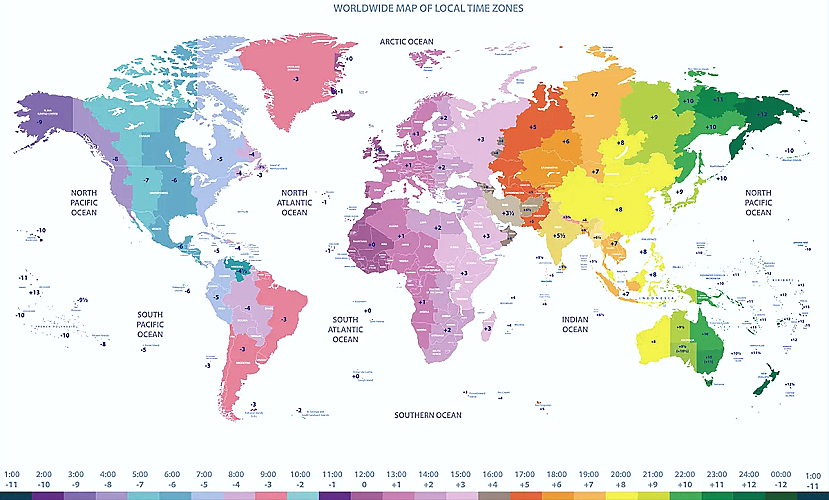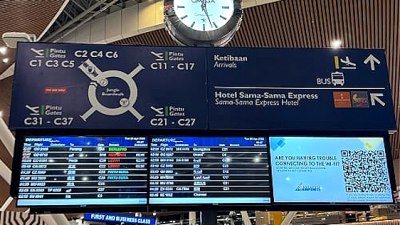
We had a 22-day tour to Yellowknife Canada plus Big Apple USA in December. On the third day after returning to the Southern Hemisphere, I started to experience jet lag.
First of all, I felt dizzy even in broad daylight, and wasn’t quite able to control my body mechanisms while losing my appetite, too.
It took a drastic turn for the worse when night fell. No matter how I mentally and physically prepared myself for a sleep, there was just no way for me to drift into sleep.
Lying on the body, I turned my body left and right every now and then as the alarm clock ticked its way into the deep night.
I tried to play some calming sleep music to help me, and even counted endless sheep, but to no avail.
The entire night was spent lying down on the bed and getting up to go to the toilet, or perhaps the kitchen for a glass of hot milk? The only thing l didn’t do was to swallow a sleeping pill!
Worse still, my heartbeat started to pick up pace having missed sleep for over 48 hours now. Overwhelmed by extreme fatigue, my body started to present some unusual conditions and my skin started to itch and feel numb.
However, having completely consumed my physiological battery and my resistance began to give way, that was when I spontaneously “passed out” out of utter exhaustion.
Waking up the following morning, I was still not in tiptop mental state and the dreadful jet lag still visited “punctually”.
Such physiological signals and sleeplessness could go on for around seven to ten days for some people! I call that a “natural tormenting disaster”!
A friend jeered at me: You have broken the regular rules of the Earth, and this is what you deserve! I mumbled: That’s the only planet we have. Why can’t we just simply divide it into two time belts: day and night?
Today, 193 countries and territories on this planet are divided into 24 different time zones, with the biggest time difference being 22 hours!
Did you know that the Siberian railway in Russia straddles an enormous length of 9,288 kilometres in total? If you set off from Vladivostok in the Far East, you will have to cross seven different time zones before arriving in Moscow! This is enough to make even the Russians insane. Let alone foreign tourists!
Meanwhile, people in countries with vast land masses such as the United States, Canada and Europe will invariably have to lead their daily lives according to the different time zones they are physically in.
China is, no doubt, the best. Despite its massive 5,200-kilometre east-west breadth, which should divide the country into five different time zones by right, there is only one standard time zone based on the time in Beijing, making life easier for every Chinese national.
However, when you travel to Xinjiang, you may notice that only government departments will adopt the Beijing time, while the native Uighurs continue to carry on with their lives based on the local Xinjiang time that is two hours behind the national time.
As for Malaysia, we had in 1981 fast-forwarded our clocks from GMT+7.30 by 30 minutes to synchronise with East Malaysia. Back then Singapore also followed our GMT+8 time, and from then on, we have been lying in the same time zone as China!
Under such circumstances, I really wonder how the pilots and flight attendants on long-haul flights overcome the jet lag phenomenon.
I asked my friend Captain Yao and the standard answer I received from him is this: This is our profession, and during our training we were given some professional guidance on this. After some time we just got used to it and learned to overcome jet lag!
Captain Yao continued: With the aircraft getting more and more advanced, such as Boeing 787 and Airbus 350 with much lower noise level and more comfortable cabin humidity to prevent dehydration. This makes breathing smoother and helps sleep in order to minimise the symptoms of jet lag.
I then turned to ask a flight attendant how she managed to overcome jet lag. She replied smilingly: There are “beds” inside the cabin for flight attendants to take turns to sleep for one to three hours during a long-haul flight. The short nap helps mitigate the discomfort from jet lag. This is required under civil aviation regulations, and indeed it helps a lot!
Sounds simple and fun, but in the end I guess it’s still a person’s strong adaptability that matters. More importantly, you will need to take the torment of jet lag before you get to savour the sweetness of flying across the globe!
William, who always flies long distances, has his own ways of tackling jet lag. He always has the habit of adequately preparing himself before a long-haul flight, and will arrange his life routines onboard the aircraft based on the arrival time at his destination.
Take for example, if the flight takes off at 10 p.m. local time, and if the time now at his destination Kuala Lumpur is 10 in the morning, then he will try not to let himself fall asleep by watching a movie, eating something, drinking apple juice, plain water, some caffeinated drink or alcohol.
In short, he must not fall into a deep sleep so that when he arrives at the destination at night (local time), he will get very tired and can sleep well.
On the contrary, if the flight takes off during the day but it’s night time now at the destination, then he will go to sleep without any delay. In case you have a hard time falling asleep, he suggests taking a mild sleeping pill to help you sleep.
Jet lag is defined as extreme tiredness and other physical effects felt by a person after a long flight across different time zones. In other words, jet lag disrupts the human biological clock, creating confusion in our sleep, dietary and other physiological activities, and hence physiological changes such as sleeplessness and reduced appetite.
Generally speaking, jet lag happens fairly and equally to every traveller, although the severity differs from individual to individual.
As a matter of fact, as our age advances, the discomfort from jet lag will also get increasingly intense and the recovery time longer.
To mitigate the stress from jet lag, the solution of 63-year-old Karen seems to suit me best!
After returning to her home in PJ, Karen will first take a short rest and then go straight to the hill behind her house for a 30- to 60-minute hike while stretching her muscles. After that, she will carry on with her daily routines as usual, but will refrain from coffee and alcohol for the time being.
In short, just shed some sweat to promote metabolism.
Meanwhile, PSC says: I soak my legs in hot water every night, and this just works as well!
As for me, I will choose to hike at Ketumbar Hill behind my house. Along the way, I might occasionally come across a family of wild boars roaming in the jungle. Isn’t that interesting and invigorating?
As a matter of fact, we can always take cues from individual experiences and suggestions in overcoming jet lag. That said, in the end, what matters is still our own determination and willpower, as well as our ability to slowly make adjustments in accordance with our own body’s adaptability.
Anyway, don’t give up flying just because of fear of jet lag, as you will lose the fun of seeing the world!
Saint Augustine once said: The world is a book, and those who do not travel read only a page.
2023 is now officially behind us. Will you continue to join me reading the world in 2024?
(Lee San is Founder and Group Executive Chairman of Apple Vacations. He has travelled to 132 countries, six continents, and enjoys sharing his travel stories and insights. He has also authored five books.)
ADVERTISEMENT
ADVERTISEMENT








































